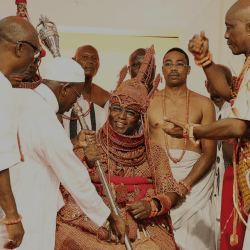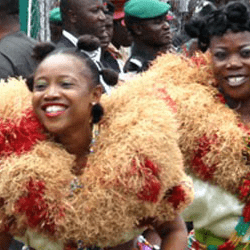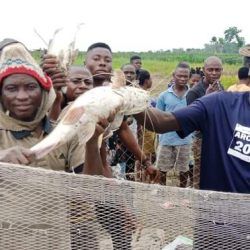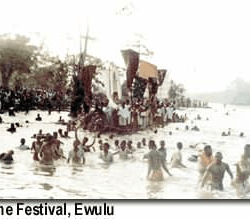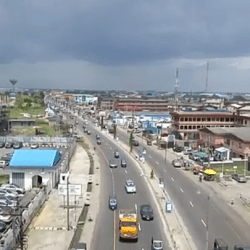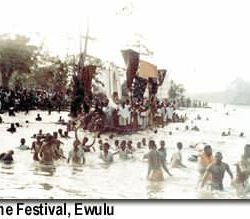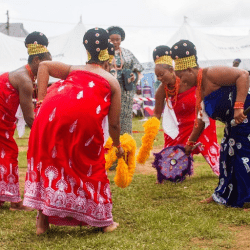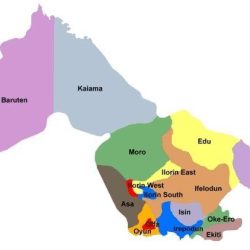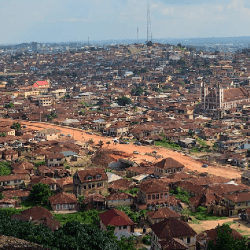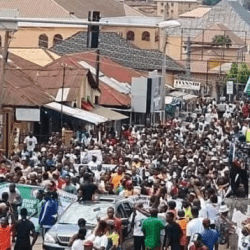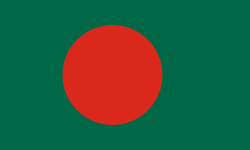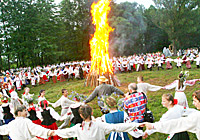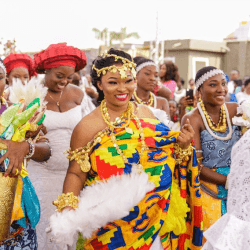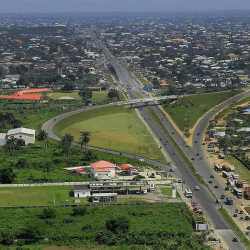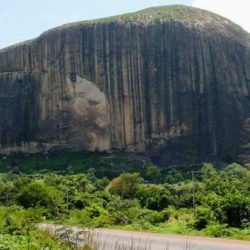The people of Bauchi State are known for their traditional wrestling and boxing dexterity, which attracts participants even from neighboring countries of Niger, Chad and Cameroon. The traditional wrestling is known as Kokowa while the traditional boxing is called Dambe.
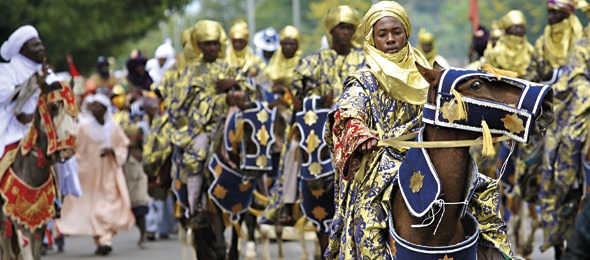
Aside these festivals, the state also holds the Bauchi State Festival of Arts and Culture (BAFEST). This annual event is held among Local governments. It includes a display of various traditions of the people of the state in the fields of traditional dances, music, arts, crafts, and fashion designs, as well as inventions and innovations.
Bauchi state is known for its arts and crafts which include beautiful embroidered caps and gowns (known as babbanriga), fiber craft, and decorated calabashes. It is also very versatile in the production of metal works (such as weaponry), agricultural tools, pottery, and leather works. The leather works include the production of sitting poufs, bags, footwear, and footballs.
Mat weaving is also a common craft in several Local Government Areas like Zaki, Ningi, Misau, etc. The outstanding festivals include Durbar whose main feature is horse racing. The durbar features the parade of horses from the Eid-prayer ground to the palace of the traditional rulers where the horse-racing and other display of horse man ship takes place.
Other festivals are the Kyaro war dance performed by the Warji ethnic groups, Afizere dance a traditional dance of the Jarawa people of Toro Local Government, Takai dance which is popular among the Hausa-Fulanis, Ngat-al-Bajar dance popular among the people of Dass Local Government, Lawurba dance peculiar to Sayawa people of Tafawa Balewa and Bogoro Local Governments, and Amanya, a naming ceremony festival among the Badawa people in Zaki Local Government.
Nigerians know Bauchi as the Home of Peace & Hospitality and that is what it is. Over the years, Bauchi State has been able to produce some of the best tourist sites in the country. We have taken out time to see what the people of Bauchi are famous for and it may interest you to know about some of our findings, the following are some of the traditional activities mention above;
The traditional Wresting and Boxing
Wresting and boxing have become a famous event that attracts a lot of people to the state. Interestingly, you’ll also find people from other African countries like Cameroon, Chad and Niger state coming out here to participate in the events. The boxing is known as Dambe while Kokowa is the traditional wresting. Bauchi State Festival of Arts and Culture (BAFEST). The Bauchi State Festival of Arts and Culture (BAFEST) is a great festival that is well attended every year by many people. This event is set up to showcase the rich cultural heritage specific to the different local government areas in the state. It always makes for an exhilarating experience.
Fashion Sense
Babanriga is already a popular type of gown that has spread across the country. This style originated from Bauchi and they are famed for the pretty embroidered gowns and the accompanying caps. Also, the interior design industry is great here with its leather works, pottery, agricultural tools and metal works. You can buy some of these items at a very low cost compared to what you can get from any showroom in the country.
Durbar Festival
The Durbar festival is popular for the horse racing that happens at the event. The parades of beautifully decorated horses that are seen from the Eid prayer ground down to the traditional ruler’s palace just stokes your anticipation for the main race that happens at the event. You’ll get to see the horsemen display some incredible moves that would make the experience worth your while.
Kyaro War Dance
This war dance is sure to impress you because of the way that the dance is performed. Anyone who has witnessed this dance will always be eager to come back to see it again.
These are some of the events and activities that buttress the point of Bauchi State being an amazing place to visit during your vacation. Be sure to schedule your next vacation to Bauchi such that you can get to witness or experience some of these events.
Bauchi
Bauchi State has gone through a much transformation since it was created. During the colonial era up to independence, it formed part of the Bauchi-Plateau of the then Northern Region, until the 1967 state creation exercise, when the Bauchi, Borno, and Adamawa provinces constituted the former North-Eastern State.





With the creation of Bauchi state in 1976, then comprising present Bauchi and Gombe states, it included 16 Local Government Areas. The number of Local Government Areas in the then Bauchi State was increased to 20 and later to 23. However, in 1997 when Gombe state was created out of Bauchi and additional local governments were created in the country, Bauchi State was left with 20 Local Government Areas.

Bauchi Local Governments Areas (LGAs)
Bauchi State has 20 (twenty) Local Governments Areas (LGAs), namely: Alkaleri, Bauchi, Bogoro, Dambam, Darazo, Dass, Gamawa, Giade, Ganjuwa, Jama’are, Itas – Gadau, Katagum, Kirfi, Misau, Ningi, Shira, Tafawa Balewa, Toro, Warji, and Zaki.
- Alkaleri
- Bauchi
- Bogoro
- Damban
- Darazo
- Dass
- Gamawa
- Ganjuwa
- Giade
- Itas/Gadau
- Jama’are
- Katagum
- Kirfi
- Misau
- Ningi
- Shira
- Tafawa-Balewa
- Toro
- Warji
- Zaki
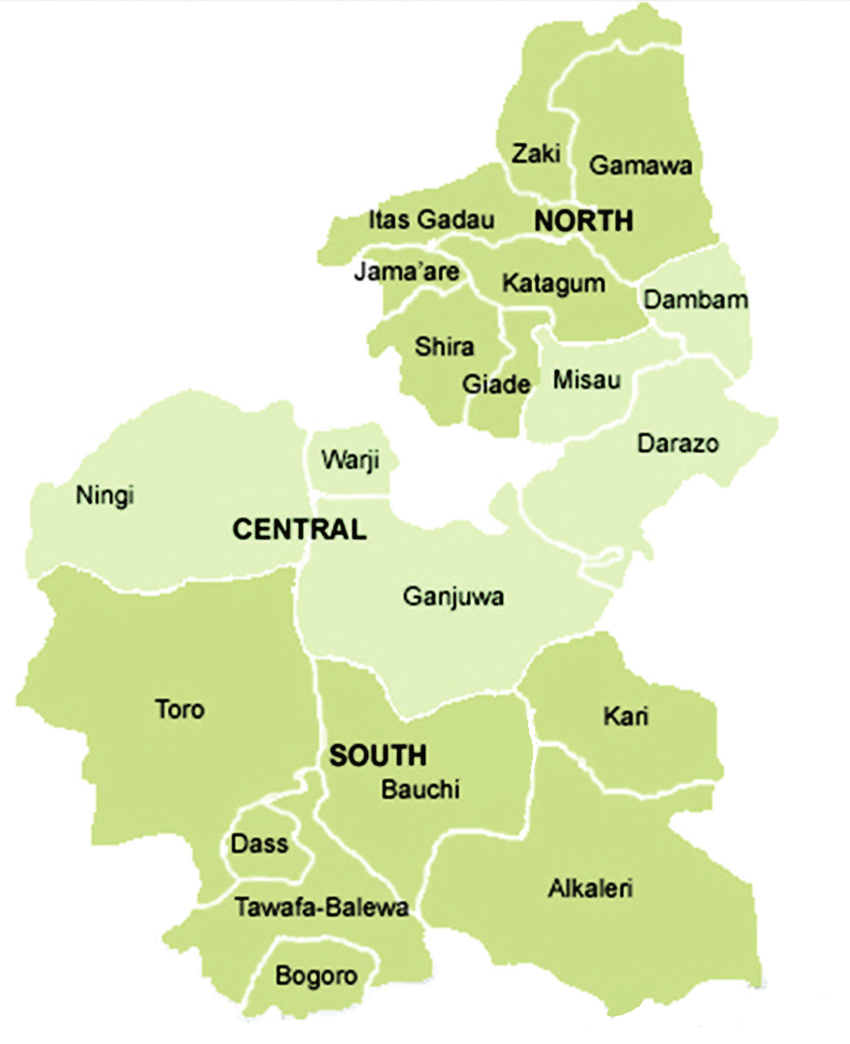
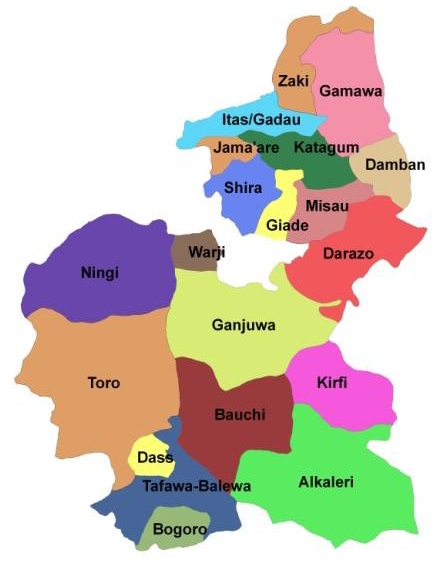
List of Bauchi State’s 20 Local Governments Areas, headquarters and land area
| SN | LGA | Area (km2) | Headquarters |
| 1. | Alkaleri | 5,918 | Alkaleri |
| 2. | Bauchi | 3,687 | Bauchi |
| 3. | Bogoro | 894 | Bogoro |
| 4. | Damban | 1,077 | Damban |
| 5. | Darazo | 3,015 | Darazo |
| 6. | Dass | 535 | Dass |
| 7. | Gamawa | 2,925 | Gamawa |
| 8. | Ganjuwa | 5,059 | Kafin Madaki |
| 9. | Giade | 668 | Giade |
| 10. | Itas/Gadau | 1,398 | Itas |
| 11. | Jamaare | 493 | Jamaare |
| 12. | Katagum | 1,436 | Azare |
| 13. | Kirfi | 2,371 | Kirfi |
| 14. | Misau | 1,226 | Misau |
| 15. | Ningi | 4,625 | Ningi |
| 16. | Shira | 1,321 | Yana |
| 17. | Tafawa Balewa | 2,515 | T/Balewa] |
| 18. | Toro | 6,932 | Toro |
| 19. | Warji | 625 | Warji |
| 20. | Zaki | 1,476 | Katagum |
Bauchi State is located between latitudes 9° 3′ and 12° 3′ north of the equator with a total land area of 49,119 km² representing about 5.3% of Nigeria’s total land mass. The state is bordered by seven states; namely Kano and Jigawa to the north, Taraba and Plateau to the south, Gombe and Yobe to the east and Kaduna to the west.
Bauchi state has two distinctive vegetation zones, namely, the Sudan Savannah and the Sahel Savannah. Sudan savannah vegetation covers the southern part of Bauchi state where the vegetation gets richer and richer towards the south, especially along water sources or rivers, but generally, the vegetation is less uniform and grasses are shorter than what grows even farther south, that is, in the forest zone of the middle belt.
Languages of Bauchi State per LGA
| LGA | Languages |
|---|---|
| Alkaleri | Dass; Bole; Duguri; Giiwo; Guruntum-Mbaaru; Labir; Tangale |
| Bauchi | Bankal; Duguri; Dulbu; Galambu; Gera; Geruma; Giiwo; Guruntum-Mbaaru; Ju; Kir-Balar; Labir; Luri; Mangas; Mbat; Pa’a; Polci; Shiki; Tala; Zangwal |
| Bogoro | Sayawa(Za’ar) |
| Darazo | Bole; Deno; Diri; Giiwo; Mburku; Ngamo; Zumbun |
| Dass | Bankal; Dass; Gwak; Polci; Saya; Shall-Zwall; Zari |
| Dukku | Bole |
| Gamawa | Karekare |
| Ganjuwa | Ciwogai; Gera; Geruma; Jimi; Kariya; Kubi; Miya |
| Kirfi | Bure |
| Misau | Fulato/Borno; Shuwa; Kanuri; Hausa; Fulani |
| Ningi | Diri; Gamo-Ningi; Kudu-Camo; Pa’a; Siri; Warji; Geruma |
| Tafawa Balewa | Sur; Vaghat-Ya-Bijim-Legeri; Zari; Bankal; Gwak; Izere; Sayawa(Za’ar) |
| Toro | Bankal; Dass; Geji; Geruma; Gwa; Gyem; Iguta; Izere; Jere; Lame; Lemoro; Mawa; Panawa; Polci; Sanga; Saya; Shau; Tunzuii; Zari; Zeem; Ziriya |
| Zaki | Bade |
Other languages of Bauchi State are Ajawa, Beele, Berom, Kanuri, Kwaami, Manga, Pero, and Piya-Kwonci.

Sahel type of the savannah, which is also known as the semi-desert vegetation, becomes manifest from the middle of the state as one moves from the state’s south to its north. This type of vegetation comprises isolated stands of thorny shrubs. On the other hand, the southwestern part of the state is mountainous as a result of the continuation of the Jos Plateau, while the northern part is generally sandy.
Yankari has become the most developed wildlife park in Nigeria with a lot of attractions for visitors with a wide variety of flora fauna. The park is famous for its variety of animals available for viewing around the year, though the animals are better watched between November and May period of the dry season when the animals converge around the Gaji River in the park.
Bauchi is a city in northeast Nigeria, the capital of Bauchi State, of the Bauchi Local Government Area within that State, and of the traditional Bauchi Emirate. It is located on the northern edge of the Jos Plateau, at an elevation of 616 m. The city has a population of 316,173 (2004). The Local Government Area covers an area of 3,687 km2 and had a population of 493,810 at the time of the 2006 Census.
The city was founded by Yaqub ibn Dadi, the only non-Fulani flag-bearer of the Sokoto Empire. The name was derived from a hunter called Baushe, who advised Yaqub to build his city west of the Warinje Mountain. In return Yaqub promised to name his city after the hunter. Abubakar Tafawa Balewa is buried in the city, while the Yankari National Park is 110 KM from the state capital. The city lies on the Port Harcourt – Maiduguri railway line. The Bauchi State Library Board was established-in-1976.
Bauchi state is a heterogeneous state, with predominant tribes like, Hausa, Fulani, Jarawa, Tangale, Waja, Balewa, Sayawa and Tarewa. It is made up of 20 local government areas, namely: Bauchi, Tafawa Balewa, Bogoro, Katagum, Alkaleri, Dambam, Giade, Ganjuwa, Darazo, Dass, Ningi, Shira, Gamawa, Itas/Gadau, Jam’are, Kirfi, Toro, Warji, Zaki, Misau.
Bauchi state is an agricultural state. Its vast fertile soil is an added advantage for agricultural products, which include maize, rice, millet, groundnut and guinea corn. Irrigation fanning is practiced and supported by the use of dams like Balanga dam, etc. Cattle and other livestock are also reared in the state.
The state has industries like the Bazamri PVC – Wire Limited, Kuda Nails Factory, Yankari Natural Water Company, Zaki Flour Mills and Arewa Ceramic Industry and others.


